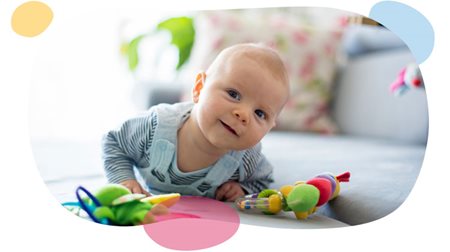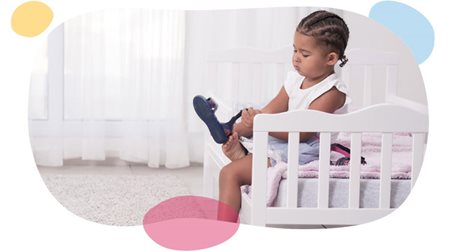Parents have several ways to track their children’s progress as they grow. Some of the most important tools for both parents and pediatricians in this effort are developmental milestones. These milestones essentially provide a checklist throughout early childhood to determine how your child is tracking compared to other children of the same age, according to the American Academy of Pediatrics.
The list of milestones is quite large and covers multiple categories, including social and emotional milestones, language and communication milestones, cognitive milestones and movement and physical development milestones. These milestones change over time as your children age. The CDC tracks milestones for the ages of 2 months, 4 months, 6 months, 9 months, 1 year, 18 months, 2 years, 3 years, 4 years and 5 years.
What are common fine motor delays to look for?
Here are just a few of the many milestones to look out for from birth to 3 years of age, and some of the implications if the milestones are not achieved. This chart was compiled using data from both the CDC and the American Occupational Therapy Association (AOTA).
Motor Skills Milestones in Babies

| Age |
Developmental Milestone |
Possible Implications If Milestones Not Achieved |
2-6 months
|
- Can hold head up and begins to push up when lying on stomach
- Follows things with eyes and recognize people at a distance
- Plays with both hands at midline and brings hands and toys to mouth
- Can hold, shake and swipe at toys
- Uses hands and eyes together to reach for toys
|
- Lack of muscle development
- Delay of independent play
- Delays in interactions with toys and sensory objects, contributing to delays in sensory development
|
| 6-12 months |
- Reaches and grasps in all directions
- Shows curiosity about things and tries to pick up things that are out of reach
- Picks things up with thumb and index finger
- Imitates simple motor actions (shaking, banging, clapping)
- Transfers object from one hand to the other
- Begins to use toys according to their purpose
- Begins to finger feed and to hold a bottle
|
- Lack of muscle development
- Delay of independent play
- Delays in interactions with toys and sensory objects, contributing to delays in sensory development
|
Motor Skill Milestones in Toddlers

| Age |
Developmental Milestone |
Possible Implications If Milestones Not Achieved |
| 1-2 years |
- Plays games such as “peek-a-boo” and “pat-a-cake”
- Starts to use common items such as eating utensils or hairbrushes correctly
- Puts objects in small spaces and stacks objects such as blocks
- Self-feeds with a spoon with minimal assistance
- Pokes with their index finger
- Begin to imitate drawing lines with a crayon
|
- Lack of hand and finger strength development
- Delay of independent play skills
- Delay of self-feeding and other self-care skills
- Delay of object manipulation skills
|
| 2-3 years |
- Might use one hand more than the other
- Builds towers of four or more blocks
- Follows two-step instructions, such as “Pick up your clothes and put them in the closet.”
- Draws or paints circles using a wrist action
- Dresses and undresses self
- Uses both hands to complete tasks such as snipping with scissors and buttoning
- Can work toys with levers and moving parts
|
- Delay of self-feeding and other self-care skills
- Delay of pre-writing skills development
- Delay of object manipulation skills, such as using pencils or scissors
- Frustration when trying to manipulate small objects or toys
|
Along with working closely with your pediatrician, you can also use the Milestone Tracker mobile app offered by the CDC to monitor developmental progress.

What should you do when you notice a motor delay in your child?
The large number of milestones for your children can be hard to monitor all by yourself, which is why it’s important to establish a close partnership with a trusted pediatrician. With each visit to the pediatrician’s office, you and your doctor can review your child’s progress and look for any areas where they may be showing delays.
If you or your pediatrician notice any developmental delays, you’ll want to discuss the treatment options available for your child. Early intervention is often the key to your child’s future social and academic success.
The Rehabilitation Services team at Nicklaus Children’s Hospital offers a wide range of services to help children with most types of developmental delays. From speech-language pathologists to physical therapists to occupational therapists and more, Nicklaus’s Rehabilitation Services team is ready to assist you and your family and help your children achieve their full potential.
While appointments are available throughout the day, appointments are available between the hours of 8 a.m. and 2 p.m. So, if your child is preschool age and in need of rehabilitation services, don’t delay. You can request an appointment by calling (305) 663-8413 or by scheduling an appointment online.
Prepared by:
Narda Henry, MS, OTR/L, Clinical Specialist
Jenny Guerrero, OTR/L, Clinical Specialist